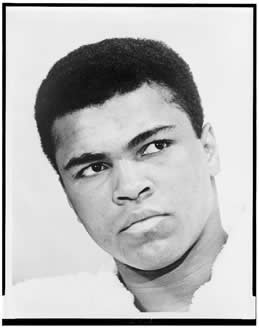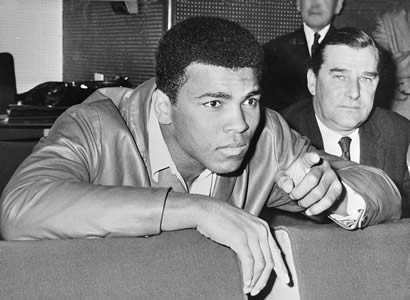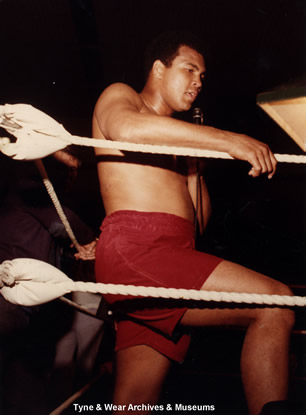Muhammad Ali
A parable about spiritual warfare

by Dennis Pollock
The apostle Paul loved to compare the Christian life to various types of conflicts. In Ephesians he compares it to a wrestling match, writing: "We do not wrestle against flesh and blood, but against principalities, against powers, against the rulers of the darkness of this age, against spiritual hosts of wickedness in the heavenly places" (Ephesians 6:12). Writing to Timothy he calls it a fight, encouraging the young minister to "fight the good fight of faith." To the Corinthians he likens it to a war, saying, "For the weapons of our warfare are not carnal but mighty in God for pulling down strongholds" (2 Corinthians 10:4). Paul's view of Christianity is clearly a militant one. Never does he liken it to a picnic, a stroll, or an afternoon nap!
Since, according to Jesus, "the sons of this world are more shrewd… than the sons of light" (Luke 16:8), we can sometimes learn a few things about how we should approach our spiritual warfare by observing the successful actions of soldiers, wrestlers, and boxers. (Actually you have to forget about the wrestlers since professional wrestling is little more than outlandish, choreographed entertainment.) In this devotional I want to share with you an insight I gained from Muhammad Ali's unexpected defeat of George Foreman in the famous "rumble in the jungle."
I have to begin with a confession: I have never been a fan of Muhammad Ali. In fact just about the only time I have watched boxing on television was when Ali was fighting, and the only reason I watched it was in the fervent hope that he would be beaten. I certainly respected his abilities as a boxer, but his loud, arrogant boasting and his cruel mocking of his opponents disgusted me. That being said, I have to acknowledge that Ali's strategy to defeat the younger, tougher, and stronger Foreman was sheer genius, and can serve as a lesson for all of us.
Rumble in the Jungle
The Ali/Foreman fight will go down not only as one of the greatest boxing matches of the last century, but clearly one of the most dramatic and fascinating sporting events in all of history. Promoter Don King had persuaded the dictator of what was then called Zaire, Joseph Mubutu, to put up ten million dollars for Ali and Foreman to split equally, in order to bring them to Zaire. In those days this sum was unheard of, and so a major heavyweight championship fight was scheduled in Kinshasa, Zaire. The two fighters could hardly have been more different. Foreman in those days was an angry young man, mean, brutal, and silent. He had a way of glaring at folks that sent chills down the spine. He trained in seclusion and had little interest in mingling with the local Africans. His attitude seemed to be: "I don't want to be here, I don't like being here, I will train hard, beat Ali, and get home as quickly as possible."
Ali, on the other hand, seemed to be having the time of his life. He mingled freely with the Africans, joked with reporters, and made himself accessible to almost anyone who wanted to interview him. He made up poems, boasted of how Foreman could never hit what he could not see, and gave every impression of total confidence. In truth Ali knew he was in for the fight of his life. In one rare candid moment he admitted, "Foreman can hit harder than me." The oddsmakers were giving Foreman a 3 to 1 and 4 to 1 advantage. Foreman's record was a perfect 40 wins and 0 losses. Not only had Foreman beaten every opponent, he had crushed them. Most of his fights never made it to the fourth round. In the last eight fights he had won by knockouts in the first and second rounds. In the eyes of many boxing professionals George Foreman punched harder than any fighter in the history of the sport. At the age of 26 he was just entering his prime in strength, stamina, and quickness.
Ali, at 32, was no old man, but he had lost fights to Ken Norton and Joe Frazier, and seemed to be on the way out. Even many of Ali's staff secretly worried about the fight. Some not only worried about their boss being beaten, but feared he might even be killed in the ring by this monster of a fighter. Heavyweight boxer Henry Clark told reporters: "George does not hit like other fighters. Even a punch in the arms leaves you feeling paralyzed… Ali is a friend of mine and I'm afraid he's going to get hurt. George is the most punishing human being I've ever been with."

Just before the fight was to begin, Ali's dressing room felt like a wake. The normal joking and bantering was notably absent, and Ali vainly tried to play the part of a cheerleader and pep up his gloomy friends. Finally the fight began. Ali knew from the beginning that there was no way he was going to outpunch the stronger, tougher Foreman when he was fresh. He initially planned to dance and move, and keep Foreman at bay until the later rounds. But Foreman had been prepared for this and had spent much of his training practicing lateral moves that would keep Ali from escaping. In addition to Foreman's ability to cut off Ali's strategic retreats, it was soon apparent that the canvas floor of the ring was "slow." Ali realized that his plans for dancing and moving all around the ring were not going to work here.
Rope-a-Dope
Midway through the second round Muhammad Ali adjusted and began what boxing analysts consider the strangest and most bizarre boxing strategy in the history of the sport – a strategy now known as "rope-a-dope." He began to deliberately back himself into the ropes and made few attempts to come off of them. For the next six rounds he would fight his opponent from the ropes. Normally this is the last thing any boxer would ever do. We have an expression "on the ropes" which we use to refer to someone who is in serious trouble. But in this case Ali was using the ropes as his best friend. Norman Mailer wrote: "Standing on one's feet, it is painful to absorb a heavy body punch even when blocked with one's arm. The torso, the legs and the spine take the shock. Leaning on the ropes, however, Ali can pass it along; the rope will receive the strain." Ali began to put his big, bony arms up, cover his face with his gloves and his belly with his elbows, and let Foreman flail away.
It wasn't all defensive however. When he saw an opportunity Ali would stick and jab his opponent with powerful rights and lefts. Often these landed just as Foreman was moving in to strike, and thus both the power and effectiveness of Ali's blows was multiplied. From time to time Ali would come off the ropes, fight a bit in the center of the ring, and then retreat to the ropes again. This went on for six rounds. The result of this was that neither man could knock the other out. Fighting in this way did not allow Foreman to use his superior strength and punching power to really tag Ali the way he had done with his other opponents. Often Ali would lean way back against the ropes and Foreman's punches would miss altogether. George Plimpton later wrote that Ali reminded him of a man leaning out of the window of his house to see what was on his roof. Strangely, despite fighting from this clearly defensive posture, Ali seemed to be giving as much as he was getting.
But something was happening during these six strange rounds of fighting. George Foreman was becoming exhausted. Ali was tiring as well, but Foreman was tiring far more. It began to be evident in the fourth round. By rounds six and seven it was obvious that the powerful puncher was punching himself out. Commentators who had been wondering why Ali was staying on the ropes were beginning to get it. Foreman's punches no longer had the power of those early rounds; some of them were now being thrown so lightly they wouldn't have knocked down an old man. Finally, at the end of the eighth round, Ali came off the ropes, and did some serious punching of his own. A left and a right, and then another left followed by a powerful straight right to Foreman's jaw. The exhausted Foreman was knocked to the canvas, the first time ever in his career. After a ten count, Ali had won the fight.
Point of the story
 Muhammad Ali could never have defeated George Foreman in the first couple of rounds. His opponent was far too strong. Had Ali determined to stand toe to toe and slug it out with Foreman in the early going, he would surely have been beaten. But the wily veteran fighter determined to reserve his strength, sting his opponent where he could, and allow time to pass. His plan worked to perfection. What he could never have done in the first round, he accomplished handily in the eighth. Time was on his side. Every bell that rang, every wild roundhouse punch that Foreman threw and missed, every step Ali took backwards toward the ropes, every blow to the face he blocked with his long, bony arms was bringing him closer and closer to his desired end. And when it was over it was the older Ali that the crowds cheered as winner, while George Foreman walked back to his dressing room stunned and unable to believe he had seen his first defeat.
Muhammad Ali could never have defeated George Foreman in the first couple of rounds. His opponent was far too strong. Had Ali determined to stand toe to toe and slug it out with Foreman in the early going, he would surely have been beaten. But the wily veteran fighter determined to reserve his strength, sting his opponent where he could, and allow time to pass. His plan worked to perfection. What he could never have done in the first round, he accomplished handily in the eighth. Time was on his side. Every bell that rang, every wild roundhouse punch that Foreman threw and missed, every step Ali took backwards toward the ropes, every blow to the face he blocked with his long, bony arms was bringing him closer and closer to his desired end. And when it was over it was the older Ali that the crowds cheered as winner, while George Foreman walked back to his dressing room stunned and unable to believe he had seen his first defeat.
What a powerful lesson in spiritual warfare! Any Christian who is sensitive to the realm of the spirit knows he will face spiritual attacks from time to time. We have an enemy, an opponent if you will, who is determined to bring us down. Peter tells us our adversary the devil "walks about like a roaring lion, seeking whom he may devour." To make matters worse, our enemy is stronger than us, smarter than us, more cunning than us, and he has been around for a long time, perfecting his craft. Satan and his demons have destroyed ministries, divided families, plagued people with sickness and disease, annihilated marriages, alienated friends, and split churches. They have enticed church-going, Bible-reading Christians into bed with their friends' spouses, turned preachers away from their calling, brought once prosperous families to financial ruin, beguiled teens to turn from the faith of their parents and follow the gods of pleasure, and lured once happy, hopeful people to end their lives by their own hands.
For this reason every believer must become effective in spiritual warfare. To use Paul's language we must "take up the whole armor of God" that we may be able to "withstand in the evil day." Every Christian who knows the Bible accepts this, but one of our problems is that we don't always plan for lengthy contests. In our minds, the victory should be ours after we have prayed our first prayer or claimed our first Bible promise. Sometimes this does happen. Often it does not.
There will be times when our adversary is far too tough, much too strong, and considerably too determined for us to be able to conquer him by a single prayer or a quick moment of having someone lay hands on us. In Jesus Christ the victory is ours for sure, but if you expect that it must always come in the first round, you will soon be disappointed and disillusioned. James tells us, "We count them blessed who endure." Paul tells Timothy to "endure hardship as a good soldier of Jesus Christ." The writer of Hebrews informs us that it is through faith and patience that we inherit God's promises. All these verses (and dozens more that could be quoted) make it clear that our fight of faith will often involve a lengthy struggle. What we cannot accomplish in a single spiritual blow, we can achieve through faith and patience. Jesus uses a parable in the gospel of Luke to remind us "that men always ought to pray and not lose heart."
The good news is that your enemy cannot successfully fight with you forever. Christ is too great, the word of God is too powerful, and the promises of God too sure. As with Ali, time is our friend. Every day that passes, every promise of Scripture we quote, every praise offered to our gracious Father, and every season of fasting we endure bring us closer and closer to our breakthrough and victory. Our Lord Jesus has purchased our victory over every attack of the evil one through His cross and resurrection, but still we must apply that victory through faith and patience. Often it will take time. Knowing this, "let us run with endurance the race that is set before us, looking unto Jesus, the author and finisher of our faith." In Jesus our weapons are mighty, our resources are infinite, and our victory is sure. We will prevail – in due time.
![]()
For a full listing of all devos (written and audio) go to our Devos Catalog Page.
For inspirational devos, bios of Christian leaders, free downloads, and the latest SOGM news:
Your donations are needed and greatly appreciated!

















